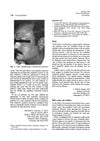 June 2023 in “Frontiers in Medicine”
June 2023 in “Frontiers in Medicine” Protein tyrosine kinases are key in male pattern baldness, affecting skin structure, hair growth, and immune responses.
 April 2023 in “JMIR Research Protocols”
April 2023 in “JMIR Research Protocols” The study aims to create a model to predict health attributes using diverse health data from Japanese adults.
 January 2022 in “Journal of Clinical and Diagnostic Research”
January 2022 in “Journal of Clinical and Diagnostic Research” Using platelet-rich plasma injections and biotin pills together significantly increases hair regrowth in men with hair loss.
 1 citations,
January 1989 in “Journal of The American Academy of Dermatology”
1 citations,
January 1989 in “Journal of The American Academy of Dermatology” The conclusion is that proper communication about the realistic effects of hair loss and skin aging treatments can improve dermatologists' credibility.
9 citations,
May 2022 in “Frontiers in Cellular Neuroscience” Mesenchymal stromal cell therapies show promise for treating various diseases but need more research and standardization.
 87 citations,
September 2014 in “International Journal of Molecular Sciences”
87 citations,
September 2014 in “International Journal of Molecular Sciences” FOXO1 is important for wound healing, but its dysfunction in diabetes can slow the healing process.
 September 2014 in “Aktuelle Dermatologie”
September 2014 in “Aktuelle Dermatologie” The symposium concluded that environmental factors significantly contribute to skin aging.
 1 citations,
September 2020 in “Cochrane library (CD-ROM)”
1 citations,
September 2020 in “Cochrane library (CD-ROM)” The analysis aims to identify the most effective and safest treatments for alopecia areata.
 April 2024 in “Frontiers in physiology”
April 2024 in “Frontiers in physiology” Immune cells are crucial for hair growth and preventing hair loss.

Benign skin tumors need accurate diagnosis to ensure proper treatment.
 October 2023 in “The Cochrane library”
October 2023 in “The Cochrane library” The medicine baricitinib was found to notably improve hair regrowth in alopecia areata, but more research is needed on its side effects and other treatments.
Male hormones can decrease the ability of immune cells to fight bacteria.
 60 citations,
June 2019 in “Ageing Research Reviews”
60 citations,
June 2019 in “Ageing Research Reviews” Fat from the body can help improve hair growth and scars when used in skin treatments.
 2 citations,
April 2023 in “Stem Cell Research & Therapy”
2 citations,
April 2023 in “Stem Cell Research & Therapy” Tiny fat-derived particles can help repair soft tissues by changing immune cell types.
 28 citations,
April 2023 in “Stem cell research & therapy”
28 citations,
April 2023 in “Stem cell research & therapy” Tiny vesicles from stem cells could be a new treatment for healing wounds.
 4 citations,
September 2021 in “Biomolecules”
4 citations,
September 2021 in “Biomolecules” Using Platelet-Rich Plasma and Adipose-Derived Mesenchymal Stem Cells together can improve healing, including wound healing, bone regeneration, and hair growth.
1 citations,
January 2020 in “Indian journal of dermatology, venereology, and leprology” CD117 and platelet-derived growth factor receptor α may play a role in alopecia areata.
 220 citations,
March 2020 in “Advanced functional materials”
220 citations,
March 2020 in “Advanced functional materials” Biomaterials with MSC-derived substances could improve tissue repair and have advantages over direct cell therapy.
 1 citations,
August 2023 in “International Journal of Molecular Sciences”
1 citations,
August 2023 in “International Journal of Molecular Sciences” Platelet Rich Plasma-Derived Extracellular Vesicles show promise for healing and regeneration but need standardized methods for consistent results.
 140 citations,
August 2011 in “Biomaterials”
140 citations,
August 2011 in “Biomaterials” Keratose, derived from human hair, is a non-toxic biomaterial good for tissue regeneration and integrates well with body tissues.
 51 citations,
March 2019 in “Journal of cellular physiology”
51 citations,
March 2019 in “Journal of cellular physiology” Platelet lysate is a promising, cost-effective option for regenerative medicine with potential clinical applications.
 April 2024 in “International journal of women's health”
April 2024 in “International journal of women's health” Adult female acne is a complex condition that can worsen with menopause, requiring holistic treatment and tailored skincare at different life stages.
 21 citations,
July 2020 in “Stem Cell Research & Therapy”
21 citations,
July 2020 in “Stem Cell Research & Therapy” Fat stem cells from diabetic mice can still help heal wounds.
 47 citations,
February 2021 in “Pharmacological research”
47 citations,
February 2021 in “Pharmacological research” Exosomes can improve skin health and offer new treatments for skin repair and rejuvenation.
 10 citations,
May 2018 in “Nutrition and Cancer”
10 citations,
May 2018 in “Nutrition and Cancer” Certain spices may help prevent and treat skin cancer, but more human trials are needed.
 December 2021 in “Research Square (Research Square)”
December 2021 in “Research Square (Research Square)” M-CSF-stimulated myeloid cells can cause alopecia areata in mice.
 170 citations,
September 2019 in “Evidence-based Complementary and Alternative Medicine”
170 citations,
September 2019 in “Evidence-based Complementary and Alternative Medicine” Some medicinal plants can help heal wounds and may lead to new treatments.
 47 citations,
December 2019 in “Frontiers in immunology”
47 citations,
December 2019 in “Frontiers in immunology” A new mutation in the STING protein causes a range of symptoms and its severity may be affected by other genetic variations; treatment with a specific inhibitor showed improvement in one patient.
 10 citations,
October 1993 in “Archives of dermatological research”
10 citations,
October 1993 in “Archives of dermatological research” Vitamin D compounds may help treat psoriasis by promoting skin cell differentiation.
 4 citations,
August 2021 in “Clinics in Dermatology”
4 citations,
August 2021 in “Clinics in Dermatology” Stem cells show promise for hair loss and skin treatments in aesthetics but need more research on safety and standard methods.


























